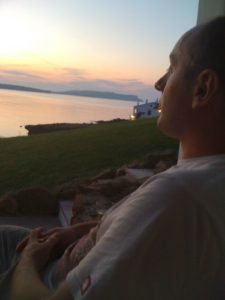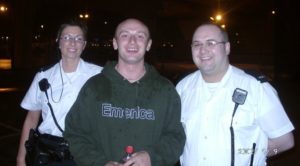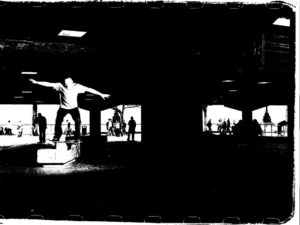In our Northern Roots series, we speak to readers originally from Northern Ireland but currently living elsewhere, or vice versa – or who’ve spent time away from NI. This week’s interviewee is Niall Neeson who is from Ballymena and now lives in London.
1. Tell us about yourself. When did you leave Northern Ireland and where did you go? What do you do now?
I was born in Ballymena in 1973. I went to Queen’s in 1991 and lived in Belfast until 1997, when I moved to Dublin and then in 2000 to London. I worked in the magazine industry until 2009 before swapping over to work in brand marketing consultancy. Most of what I do is within the sphere of international youth culture, predominantly in skateboarding.
2. What do you think when you see the Northern Ireland of today, in the news and on social media?
It’s absolutely amazing to see the energy alive in Belfast, the development of local tourism and pride in local produce. Things like the Slemish Market Garden in Ballymena have got it just right.
There was a New York Times article recently on what to do with 36 hours in Belfast. Once upon a time that would have been a punchline, but now Belfast challenges Dublin for cultural vibrancy.
Personally speaking, I think the promotion of Northern Ireland needs to get beyond the Titanic, the coastlines and Game of Thrones. People are Northern Ireland’s greatest natural resource. We are ‘people’ people – that needs to come to the forefront!
As far as the political ‘coming out’ of Northern Ireland goes, I can’t tell you anything we don’t already know. Shirley Williams was right when she said, “You get the politicians you deserve.”
 3. Are you hopeful for Northern Ireland’s future? Will Brexit make a difference?
3. Are you hopeful for Northern Ireland’s future? Will Brexit make a difference?
I mean, we’ve already achieved so much. Bearing in mind that there are only two million of us breathing at any one time, look at what Northern Ireland has given the world – especially in the creative industries. Senator Mitchell was right when he talked about our enormous capacity for compassion and generosity.
The way you notice that is when you overhear someone from Northern Ireland abroad you are compelled to say hello because outside of Ulster we all feel like family. There is something in that worth investigating, if you ask me.
On the flipside of that, you have to be realistic about Northern Ireland’s paralysis in the face of what to do about our collective social problems. It is time that doing something about hood culture in Northern Ireland is not instantly turned into a political football. Why not colour code off-licence carrier bags, for example? That will show you who is fuelling the weekend ‘no-go zones’ that plague every town in Northern Ireland. Let’s ask what role the alcohol industry has played here down the years.
Brexit will inevitably re-shuffle the deck on everything. I wish I had a crystal ball there but I doubt anyone does.
4. Do you think you will return to Northern Ireland? What could convince you to come back?
That’s a very difficult question to answer because if you are in Northern Ireland at, say, Christmas time, then you are really experiencing the ‘wouldn’t it be great if it was like this all the time’ version of Northern Ireland. All the bars are packed, the energy is tangible. Come a wet Wednesday afternoon in February, though, the pace of life slows down in a way that I struggle to handle. So, for that reason, I doubt it.
My wife is from Ballynahinch and her upbringing there was pretty joyless so she certainly has no intention of returning. Both of our very English kids love visiting, and my daughter says she is moving to Northern Ireland as soon as she is eighteen. Mind you, she says a lot of stuff!
5. What can Northern Ireland learn from the place you live now?
I’m going to say nothing, and for two reasons.
The dogs on the street know Northern Ireland needs to be less backwards, but we don’t like being moralised to by outsiders. I could never stand people who went away to university in Scotland and came back after one term talking about how cosmopolitan Dundee or somewhere like that was.
The other thing, is that I don’t think what happened in Northern Ireland during the Troubles happened because of some absence of humanity on everyone’s behalf. If anything, humanity is what we have most of, more than many. So I think Northern Ireland has a lot to teach the world.
What happened to us happened in the Balkans, in Lebanon and elsewhere. Violence is the final breakdown of communication, but once that genie is out of the bottle it is very hard to put back in.
6. If Northern Ireland had a president with sweeping powers, and it was you, what would you do?
I would sidestep Stormont to develop a voluntary, closed-door peace and reconciliation commission open to paramilitaries on both sides to unburden themselves of their guilt without it becoming another round of ‘whatabout-ery’ from the usual suspects.
Secondly, I would legalise hashish. When people talk about cannabis today they usually mean ‘Dutch skunk’, which undoubtedly has an adverse effect on people with anxiety that hashish doesn’t produce. Very little serious thought has been given to that idea.
Thirdly, I would make McGroggan’s ice cream the ice cream of God’s wee six. Sure, there are others, but nobody knows dairy produce like Ballymena folk so that would have to be implemented on day one of the new regime.
Finally, there needs to be a wide-ranging investigation into the inexplicable popularity of Harp lager, a fizzy chemical brain-rotter if ever I tasted several.
7. What would you like to see more of on Northern Slant?
In the first instance, I think that what you have done so far is a terrific achievement. New voices breaking through some of the pedestrian journalism of the last century is at least in part what Northern Ireland needs.
Purely due to my interest in youth culture, I would like to see more stuff that looks at Northern Ireland from a social not political perspective.
Who thought that a Portrush nightclub could be running classical events with the Ulster Orchestra? What do the indie kids in Larne do on a Friday evening? How do people get into surfing around the north coast? Who is the best skateboarder ever to come out of Northern Ireland?
All that stuff looks at our geeky wonderfulness without ever referring to traditional notions of identity. That’s not to say that all the talk of identity is irrelevant – clearly it matters, it just also happens to get pretty dull after a while.
8. If you could ask three Northern Ireland politicians (past or present) to dinner, who would they be? And why?
John Hume, because I think everybody who hails from where we do owes him a huge debt of gratitude. I would like the chance to do so personally.
David Ervine imbued all the qualities I respect in Ulstermen: no-nonsense, decency, low bull**** threshold. He also seemed like he could be funny when not on camera.
Lastly, Oliver Napier. That generation who knew what Northern Ireland was like before Dante’s Inferno arrived are fading from the world now: I’d like to ask him if he ever really imagined the Alliance Party becoming the electoral force in Northern Ireland politics which it has. Thirty years ago people laughed at voting Alliance as a wasted vote, and yet here they are taking names and wrecking games in a new era. Who saw that one coming?
9. Do you have a favourite quote or mantra?
There is more to peace than the absence of violence.
10. What’s your message for people back home?
Never stop reaching: everything we did, we did to ourselves. Everything we have done since, we have done for ourselves. Always only ever upwards!


